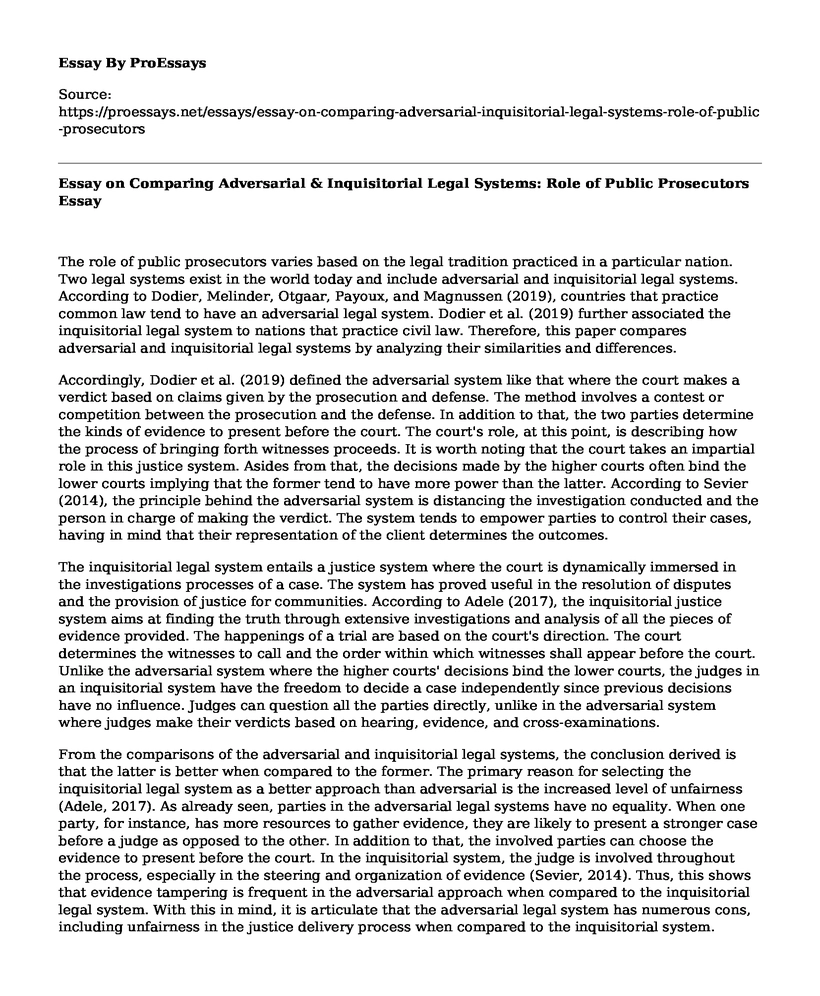The role of public prosecutors varies based on the legal tradition practiced in a particular nation. Two legal systems exist in the world today and include adversarial and inquisitorial legal systems. According to Dodier, Melinder, Otgaar, Payoux, and Magnussen (2019), countries that practice common law tend to have an adversarial legal system. Dodier et al. (2019) further associated the inquisitorial legal system to nations that practice civil law. Therefore, this paper compares adversarial and inquisitorial legal systems by analyzing their similarities and differences.
Accordingly, Dodier et al. (2019) defined the adversarial system like that where the court makes a verdict based on claims given by the prosecution and defense. The method involves a contest or competition between the prosecution and the defense. In addition to that, the two parties determine the kinds of evidence to present before the court. The court's role, at this point, is describing how the process of bringing forth witnesses proceeds. It is worth noting that the court takes an impartial role in this justice system. Asides from that, the decisions made by the higher courts often bind the lower courts implying that the former tend to have more power than the latter. According to Sevier (2014), the principle behind the adversarial system is distancing the investigation conducted and the person in charge of making the verdict. The system tends to empower parties to control their cases, having in mind that their representation of the client determines the outcomes.
The inquisitorial legal system entails a justice system where the court is dynamically immersed in the investigations processes of a case. The system has proved useful in the resolution of disputes and the provision of justice for communities. According to Adele (2017), the inquisitorial justice system aims at finding the truth through extensive investigations and analysis of all the pieces of evidence provided. The happenings of a trial are based on the court's direction. The court determines the witnesses to call and the order within which witnesses shall appear before the court. Unlike the adversarial system where the higher courts' decisions bind the lower courts, the judges in an inquisitorial system have the freedom to decide a case independently since previous decisions have no influence. Judges can question all the parties directly, unlike in the adversarial system where judges make their verdicts based on hearing, evidence, and cross-examinations.
From the comparisons of the adversarial and inquisitorial legal systems, the conclusion derived is that the latter is better when compared to the former. The primary reason for selecting the inquisitorial legal system as a better approach than adversarial is the increased level of unfairness (Adele, 2017). As already seen, parties in the adversarial legal systems have no equality. When one party, for instance, has more resources to gather evidence, they are likely to present a stronger case before a judge as opposed to the other. In addition to that, the involved parties can choose the evidence to present before the court. In the inquisitorial system, the judge is involved throughout the process, especially in the steering and organization of evidence (Sevier, 2014). Thus, this shows that evidence tampering is frequent in the adversarial approach when compared to the inquisitorial legal system. With this in mind, it is articulate that the adversarial legal system has numerous cons, including unfairness in the justice delivery process when compared to the inquisitorial system.
Conclusion
In conclusion, this paper compares the adversarial and inquisitorial legal systems. From the analysis, the adversarial system involves a contest of two parties, the defense and prosecution, in the presence of a judge who acts as a referee and makes verdict based on the acclaims of the two parties. The inquisitorial system involves a justice system where the court is included in the investigation process. The conclusion derived from the analysis is that the inquisitorial is a better approach when compared to the adversarial technique since it enhances fairness in the justice system.
References
Adele, J. (2017). Comparative analysis between adversarial and inquisitorial legal systems. SSRN Electronic Journal. doi: 10.2139/ssrn.3077365
Dodier, O., Melinder, A., Otgaar, H., Payoux, M., & Magnussen, S. (2019). Psychologists and psychiatrists in court: what do they know about eyewitness memory? A comparison of experts in inquisitorial and adversarial legal systems. Journal of Police and Criminal Psychology, 34(3), 254-262. doi: 10.1007/s11896-019-09339-0
Sevier, J. (2014). The truth-justice tradeoff: Perceptions of decisional accuracy and procedural justice in adversarial and inquisitorial legal systems. Psychology, Public Policy, and Law, 20(2), 212-224. doi: 10.1037/law0000009
Cite this page
Essay on Comparing Adversarial & Inquisitorial Legal Systems: Role of Public Prosecutors. (2023, Mar 28). Retrieved from https://proessays.net/essays/essay-on-comparing-adversarial-inquisitorial-legal-systems-role-of-public-prosecutors
If you are the original author of this essay and no longer wish to have it published on the ProEssays website, please click below to request its removal:
- Providing High-Quality Food Services for Inmates in Detention or Correctional Facilities Proposal
- Research Paper on Gun Control Movement
- Essay Sample on Rape Kit Backlog
- Falsely Accused/Racial Controversy - Research Paper
- Paper Example on Amendments
- Essay Example on Religious Freedom: The Contested Right in the US
- Prison Overcrowding: A Life-Threatening Problem - Essay Sample







